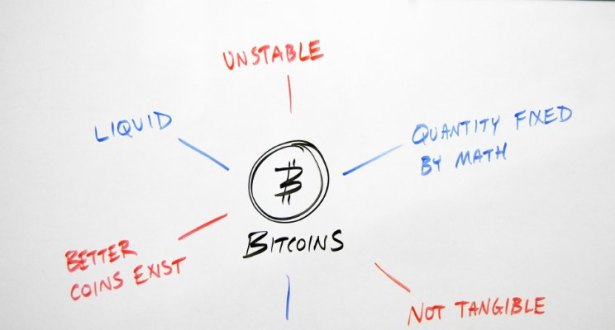
Every business needs copy. I mean, that might seem like exactly the kind of thing I would say, given that it’s my job to write copy – but it’s true, I promise.
Good copy and content can make the difference between a company that’s barely struggling to keep its head above water, and one that pulls in seven plus figures a year.
It helps build a company’s credibility and trust, win over readers with valuable content, persuade email subscribers or website visitors to spend their cash, and clearly communicate the brand’s message.
But although everyone can benefit from strong copy, some industries stand to gain more than others – and cryptocurrency is one of them.
Anyone who’s followed the news recently will most likely be aware of the recent buzz around Bitcoin, Ethereum, blockchain and other big crypto stories.
There are scare stories too; talk of bursting bubbles and crippling regulations, but the overall trend seems to be a positive one for cryptocurrency and the technology behind it.
It’s a growing industry, though, and it needs a helping hand. Here’s why:
It’s misunderstood.
Cryptocurrency hasn’t had the best press up to now. While memories of it bursting onto the mainstream scene might be fresh in the minds of some, many others will remember all too clearly the stories about its links to corruption.
Or its affiliation with the sinister goings-on of the dark net.
Or its framing as an anti-government movement.
I could go on, but the point is cryptocurrency has acquired something of a bad reputation in the eyes of the public. People who might otherwise be intrigued by the promise of a digital currency, operating outside of traditional fiat money institutions, are instead turned off by years of scaremongering and smears.
So how can good copy help?
Well, good copy is about persuasion. It’s using the facts and evidence at your disposal, along with a dash of emotion, to convince your audience that they should definitely do what you’re suggesting (which usually involves parting with their hard-earned cash).
Through well-researched, engaging copy and content, you can show people that cryptocurrency isn’t necessarily the force for evil that it’s been painted out to be.
Using quality blog posts, e-books, emails and newsletters, good copywriters can educate their audience on the good side of crypto, helping to re-frame it as the highly promising industry that it always has been.
That isn’t the only issue, of course. Even if potential crypto users are willing to trust the industry, that’s still just the first step.
The next step is understanding it.
And cryptocurrency is COMPLICATED.
From the mysterious mining process to the blockchain technology that underlies crypto and makes it so powerful, the whole topic is mired in baffling technical concepts and cutting-edge processes.
For a long time Bitcoin and its cousins were the sole domain of technical wizards, and as a result the whole space has taken on a bit of an exclusive vibe.
Nowadays, people can jump on the crypto train without knowing how to code in eight different languages or access the dark net. But even though it’s become much more accessible, crypto’s reputation as a bubble of supergeeks and genius hackers has been tough to shake off.
And there IS truth to it. Plenty of crypto concepts are difficult to translate into layman’s’ terms – mining, ICOs, the workings of blockchain technology – these are just a few ideas that non-tech people find it hard to wrap their heads around.
The solution, of course, lies in clear educational content. E-books, email courses and white papers are just a few of the mediums that crypto companies can use to inform their potential customers about what they’re getting into.
A good copywriter can take these bewildering subjects and present them in a way anyone can understand. They can remove much of the fear and uncertainty that goes with buying cryptocurrency, and help convince prospects that it isn’t such a terrifying notion.
But this fear and uncertainty isn’t restricted to the technical side of things.
That’s because cryptocurrency is risky.
Oh, yes. We’ve all heard the prophecies. Bitcoin is a bubble, it’s destined to burst, probably sooner rather than later. Woe betide those who sink money into such a precarious scheme.
With China’s ban on ICOs and exchanges last year, and constant whispers of further regulation all over the world, the world of cryptocurrency began to feel a little more uncertain.
The recent dip in Bitcoin’s value has much to do with the anxiety of investors, who are selling their currency in fears of a crash.
What’s more, the volatility of the markets isn’t the only concern for buyers – hackers lurk in the murky depths of the web.
Not too long ago a cyber security firm released a video neatly outlining how a hacker could get control of someone’s cryptocurrency wallet by intercepting their SMS authentication details.
Just to prove they weren’t kidding, the group simulated a theft of $4000 worth of Bitcoin.
For these reasons, and many others, buying cryptocurrency involves much weighing up of the pros and cons. Is the potential reward worth the not insignificant risk?
Only the buyer can decide that – but good copy can help. Many of the risks of crypto are overstated, and for several years the market has been consistently growing.
Anyone who bought a substantial amount of Bitcoin ten years ago would be extremely rich today. There’s the story, a legend in the world of digital currency, of the programmer who bought two pizzas for 10,000 Bitcoin back in 2010.
The amount he spent? Today it’s worth about $100 million.
There’s no denying that cryptocurrency is a risky field, and it’s important to note that it would be pretty irresponsible for copywriters to gloss over these risks in trying to promote products.
However, it’s important again to counteract the fear mongering with facts and allow customers to decide for themselves if the risk is worth the reward.
Even when all the natural objections to cryptocurrency have been dealt with, however, there’s still a big obstacle to overcome.
Cryptocurrency is a competitive industry
There are some 4 million crypto wallets estimated to exist. That’s a lot of customers, but when you assume some of them own multiple wallets it isn’t an INSANELY huge market (not yet, anyway).
It seems smaller still when you consider that there are upwards of 1000 cryptocurrencies out there. This means there’s a high level of competition between currencies for a relatively small buyer base.
Of course, many of these currencies are small, weak, and destined for failure. Big names like Bitcoin and Ethereum account for most of the market, with up and coming currencies fighting for the crumbs.
As crypto grows, though, opportunities may arise for smaller companies to gain investors. After all, investing in a new cryptocurrency today could yield enormous results if it blows up. Investing in Bitcoin would be a much slower (if more reliable) route to riches.
And if one of the crypto giants happens to implode, the potential for smaller competitors suddenly becomes huge.
With all this competition, good marketing is absolutely crucial. It’s vital to stand out from all the other companies out there offering seemingly identical services, highlight how you’re a better choice, and show buyers what you can bring to the table.
An effective landing page, focused email campaigns, sales copy that totally gets the target demographic – any of these, if done even slightly well, could give a new company an enormous boost.
The cryptocurrency industry is brimming with potential; it really could transform the world.





